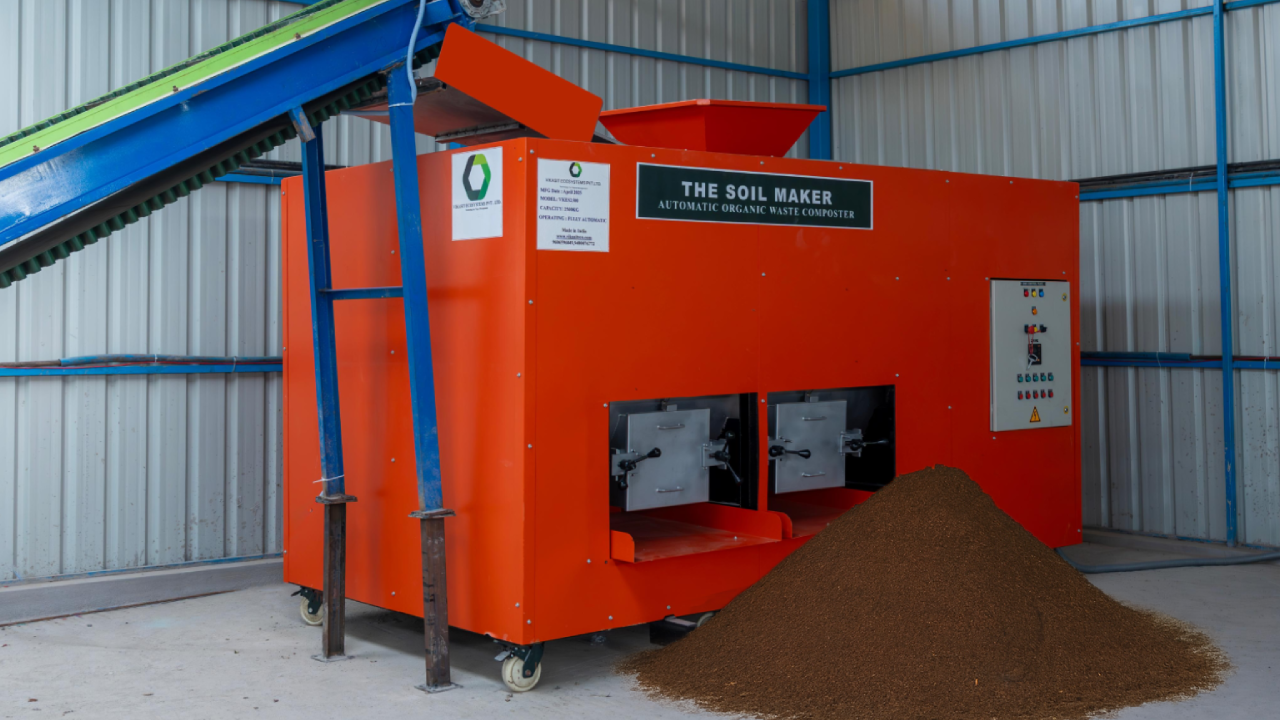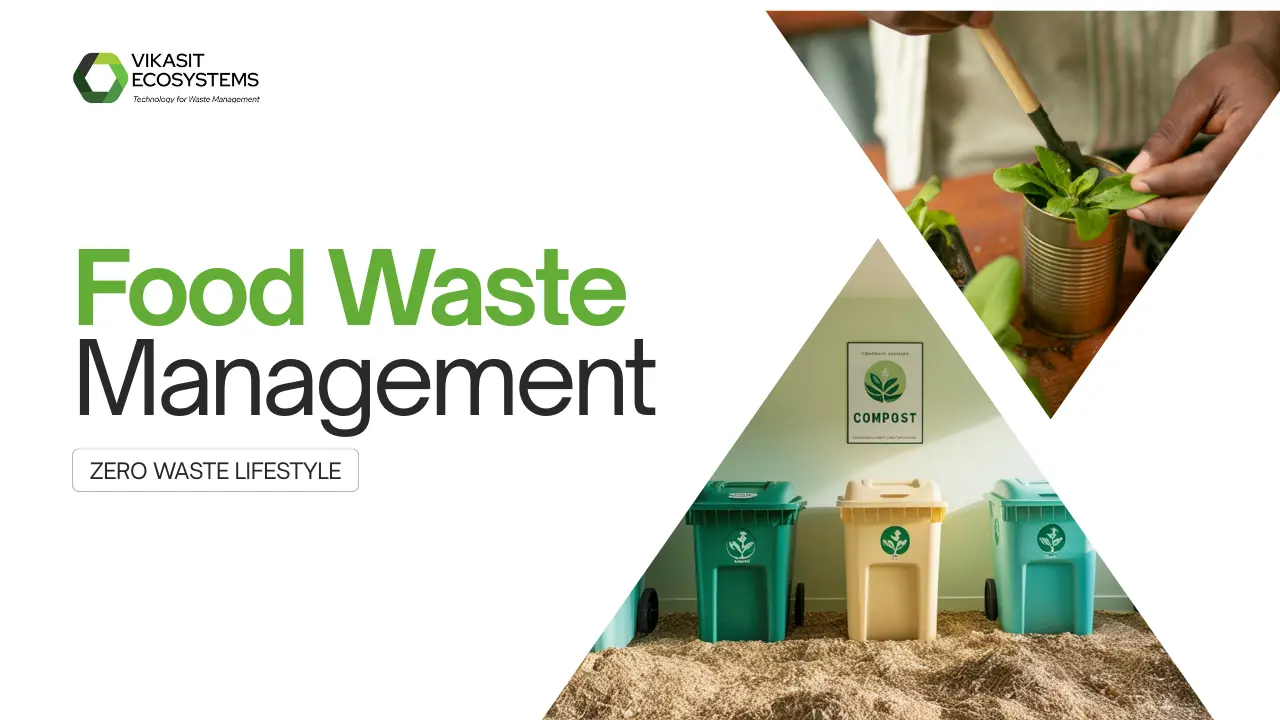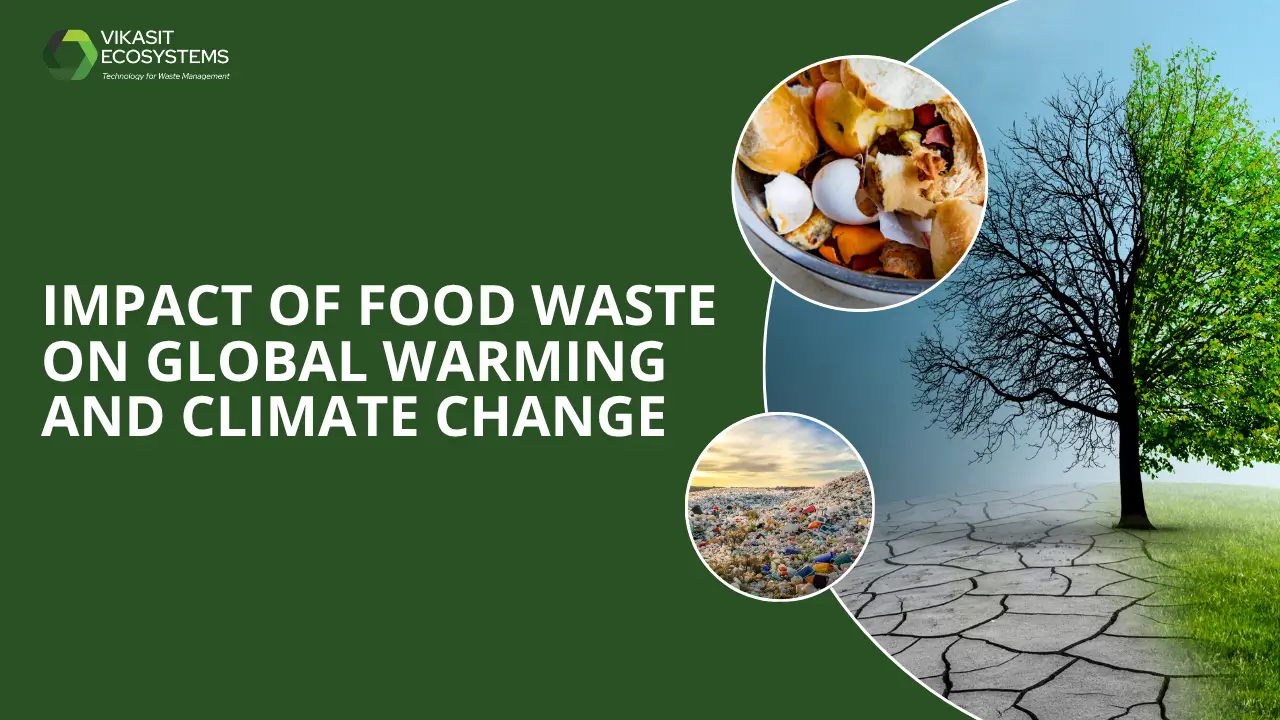Every handful of organic waste tossed aside tells a story of lost opportunity. In a world where landfills are overflowing, regulatory pressure is rising, and chemical fertilisers are harming soil and health, something has to give. Enter the Soil Maker—our flagship organic waste converter machine—a cutting-edge composting solution that transforms organic waste into nutrient-rich soil in just 3 to 4 hours. Powered by our proprietary bioculture agent, compact and efficient design, and scalable capacity (20 kg to 3 tonnes per batch), it’s not only a solution to waste but also a means to restore soil, reduce costs, and promote sustainability.
What Is the Soil Maker & How It Operates
- Speed & Proprietary Bioculture: The heart of our Soil Maker is an in-house developed microbial agent that accelerates decomposition— turning organic waste into compost in 3–4 hours, far faster than traditional methods. This is what makes it a high-performance organic waste converter machine.
- Scalable Processing: Whether you’re dealing with 20 kg per day in a villa, or multiple tonnes in an industrial site, our machines scale accordingly.
- Compact & Efficient Design: Minimal footprint, low maintenance, lower manpower, and optimised for electricity usage.
- Safe & Compliant: Odour control, pathogen reduction, and compliance with environmental / pollution control regulations are built in.
Who Should Adopt the Soil Maker?
The Soil Maker is designed for organisations that generate organic waste in volume, and need an efficient, on-site way of handling it. Key segments include:
- Real Estate Developers (residential / industrial parks) — large housing layouts, gated communities
- Facility Managers — for campuses, industrial parks, business parks, factories
- Apartment & Residential Maintenance Associations — managing food waste, garden waste etc. from many households
- Hospitals, Hotels, Restaurants & Commercial Kitchens — high organic waste output every day
- Municipal Bodies, Markets & Community Centres — public waste management needs
By installing an organic waste converter machine like the Soil Maker, these sectors save costs, reduce waste volume, and achieve sustainability goals.
Why We Need to Adopt Soil Makers: The Big Picture
- Environmental imperative: Organic waste in landfills decomposes anaerobically, producing methane, a potent greenhouse gas. Using an organic waste converter machine reduces emissions, landfill volume, and downstream pollution.
- Regulatory compliance: Many jurisdictions (India and elsewhere) have regulations around solid waste management and environmental protection. Deploying an OWC machine helps meet mandates such as waste segregation, reduction, and composting requirements.
- Cost savings: Less transport, less waste tipping fees, lower labour. Also savings on buying chemical fertilisers or soil amendments.
- CSR and public image: Facilities that reduce their waste output, generate “green soil”, and adopt modern waste practices gain credibility among residents, customers, and regulators.
- Circular economy & soil health: Organic waste is turned into compost, restoring soil fertility, nutrient balance, and microbial health.
The Outcomes: The Soil You Get & What It Contains
With the Soil Maker, the output soil / compost has been tested, and includes strong nutrient profiles and safety. Key indicators:
- pH value: ~7.8 (neutral-to-slightly alkaline), good for many plants
- Electrical Conductivity (EC): ~7.9 mmhos/cm in some tests (indicates available salts/nutrients)
- Nitrogen (N): ~2.5–3% — essential for leaf and plant growth
- Phosphorus (P): ~0.2–0.3% — supports root development & flowering
- Potassium (K): ~0.5–0.6% — needed for fruiting, flowering, stress resistance
- Organic Carbon / Organic Matter: ~0.5–0.6% – critical for soil structure and microbial life
- C:N Ratio: around 17:1 to 30:1 in tests after ~30 days (but note, our process shortens time)
- Heavy Metals: Arsenic, Cadmium, Lead, Chromium etc. in low / safe mg/kg levels in tested batches
These are indicative values from sample test results. Actual nutrient content may vary slightly depending on raw input waste, moisture, and bioculture inputs.
How the Soil (Compost) Can Be Used
The soil that comes out of the Soil Maker is ready to use immediately with a moisture content of about 15–20%. This makes it ideal for:
- Landfilling & Earthworks – can be applied directly for landfilling, embankments, and large-scale soil covering.
- Big Trees & Large Plantation – the moisture content and nutrient balance make it suitable for direct use around big trees and plantations without any resting period.
For gardening, horticulture, landscaping, and nursery use, the compost is best if rested for about 15–20 days. This allows the material to stabilize further, mellow down its pH slightly, and become gentler on delicate plants and seedlings.
The key advantage is that no further treatment is required—it is odour-free, pathogen-controlled, and safe to apply once rested.
Other applications after resting include:
- Landscaping & Gardening – parks, green belts, lawns, gardens.
- Horticulture & Nurseries – potting mixes, seedling beds, plant propagation.
- Urban Agriculture & Kitchen Gardens – vegetables, herbs, rooftop farms.
- Agriculture & Soil Reclamation – blending into farmlands to enrich soil.
- Community Compost Sales / Sharing – can be distributed as organic manure to residents or farmers.
An organic waste converter machine like the Soil Maker ensures that nothing goes to waste, and every kilogram of organic matter returns to the soil cycle.
Key Benefits of Soil Maker (Machine) + Soil (Outcome)
| From the Machine | From the Soil (Output) |
|---|---|
| Rapid processing: 3–4 hours composting time | Nutrient enrichment: N, P, K etc. improves plant health |
| Space-efficient & compact | Improves soil structure, water retention, aeration |
| Lower labour & maintenance costs | Reduces need for chemical fertilisers |
| Electricity & energy optimised | Safe (low heavy metals) and odour-free application |
| Reduces waste volume dramatically | Helps with soil microbes & organic content replenishment |
| Regulatory compliance & better CSR | Supports sustainability goals, greener image |
Why Adoption Matters Now
- Climate urgency: Reducing methane from decomposing organic matter is critical.
- Soil degradation: Overuse of chemical fertilisers and synthetic amendments are harming soil health; organic compost restores microbial life & structure.
- Rising waste problem: Urbanization leads to more organic waste; landfill space is limited and expensive.
- Economic pressures: With increasing costs of disposal and fertilisers, an organic waste converter machine provides a cost-effective alternative.
- Regulation & policy tailwinds: Governments are pushing for “waste to wealth”, solid waste management rules, and circular economy adoption.
Conclusion
The Soil Maker isn’t just a machine—it’s a transformation tool for how we view waste. By turning organic waste into valuable compost in just 3–4 hours, it closes the loop between consumption and regeneration. For facility managers, real estate developers, residential associations, or industries, it offers immediate savings, regulatory compliance, and a green reputation. For the planet, it reduces landfill pressure, cuts methane emissions, and revives soil health. And for the user, it delivers a product—nutrient-rich compost—that is ready for landfilling, plantations, and, after resting, gardening and agriculture.
By adopting an organic waste converter machine like the Soil Maker, you’re not just managing waste—you’re building a self-sufficient, sustainable ecosystem. The time to act is now.
FAQ
How fast can the Soil Maker convert waste into compost?
The Soil Maker processes organic waste in just 3 to 4 hours using our proprietary bioculture agent, making it one of the fastest organic waste converter machines in the market.
What types of waste can go into the Soil Maker?
It handles all types of organic waste such as food scraps, kitchen waste, garden clippings, and certain organic industrial by-products. Segregation of plastics, metals, and non-biodegradables is recommended for best results.
Can the compost be used immediately?
Yes. The output compost has 15–20% moisture and can be used immediately for landfilling and large trees. For gardens, nurseries, and sensitive plants, we recommend resting the compost for 15–20 days before use. No further treatment is required.
How safe is the compost for soil and plants?
The compost is odour-free, pathogen-controlled, and tested for heavy metals. Parameters like nitrogen, phosphorus, potassium, and organic carbon fall within healthy ranges, making it safe and beneficial for soil health.
Who should use the Soil Maker?
It’s ideal for real estate developers, facility managers, apartment associations, industries, hospitals, hotels, restaurants, and municipalities—anywhere organic waste is generated regularly and in bulk.
What are the major benefits for a facility adopting the Soil Maker?
Savings in waste disposal costs, manpower, and electricity.
Compliance with environmental and pollution control norms.
Positive reputation as a sustainable, self-sufficient facility.
A valuable end-product (compost) that can be reused or distributed.

Written by the Sustainability Research Team at Vikasit Ecosystems – pioneers in decentralized organic waste management and creators of The Soil Maker. Follow us for updates on green innovations, circular economy, and urban resilience.





